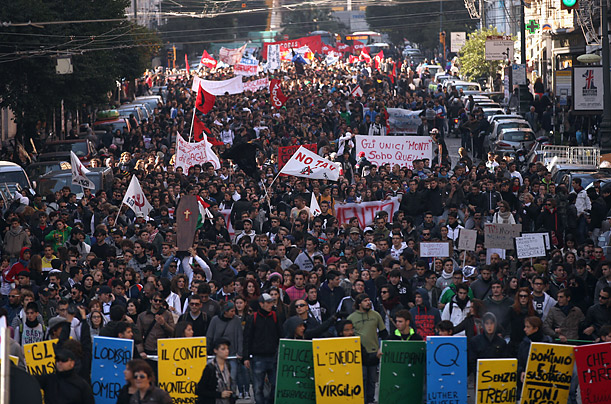Democrat March-Arpil (Number 134)
View from Germany
Interference in Italian election
by Horst Tuebert of German Foreign Policy Group

During the recent election campaign in Italy, German media commentators asked whether in the face of the euro crisis, voting in EU member states was free in the true sense of the word. The result was negative.
Long before the elections, Italy had been forced to put a severe austerity policy designed by Germany into action, the elected government having been replaced by the so called experts' government of Mario Monti, a well known banker, in 2011.
After Monti had started to enforce the austerity measures upon the country, the crisis became even worse. Gross domestic product fell by 2.2 percent in 2012. In the last quarter of 2012, the economic performance shrunk to a level it had reached ten years before. The industrial output of the country has decreased by about 25 percent since 2008. Unemployment is at record high, especially amongst young people. Poverty has risen dramatically.
As it was clear that Monti would not get a majority in the elections, many in the German political establishment favoured Pier Luigi Bersani and his Democratic Party. Bersani is very close to the German Social Democrats. Influential politicians of the Social Democratic Party of Germany met Bersani in the course of 2012, making sure that he stuck to the austerity policy Monti had started to put into action. Bersani confirmed he would continue to cut the budget. In return, German Social Democrats urged the Italian people openly to vote for him in the elections. The German meddling in the Italian election campaign resulted in Peer Steinbrück, who is running for chancellorship in Germany, meeting Bersani in Milano to support him publicly. Martin Schulz, the President of the European Parliament, a German, also demanded openly that Bersani be elected.
Immediately before the elections, even the German Foreign Minister demanded that Italy must continue with the austerity measures. He called this "a pro European course". A government spokesman confirmed that this "certainly" was the position of the German government as a whole. It was clearly understood that this was meant as a support for Bersani and Monti and as a kind of German veto against Berlusconi.
Commenting on this, the Frankfurter Allgemeine Zeitung, a conservative newspaper with good connections to government circles, came to the conclusion that this kind of interference would "more and more become business as usual". The commentator asked: "Are voters only allowed to vote for partys and politicians who have a 'reasonable', a 'correct' programme? Seems like this." If voters decided otherwise, they would be punished "through rising interest rates on government bonds", or, simply by the enforcement of strong political pressure on their country. According to the commentator, "it has turned out necessary" to stick to a certain policy which might be described as "consolidating, reforming, becoming competitive" - just the austerity policy which has been pushed through in the EU by Germany. As the commentator remarked, national parliaments are being reduced to the role of executing this kind of policy dictated by the German government. People don't have a free vote in the true sense of the word anymore; democracy has been receding against foreign influence from the most powerful county in the EU.